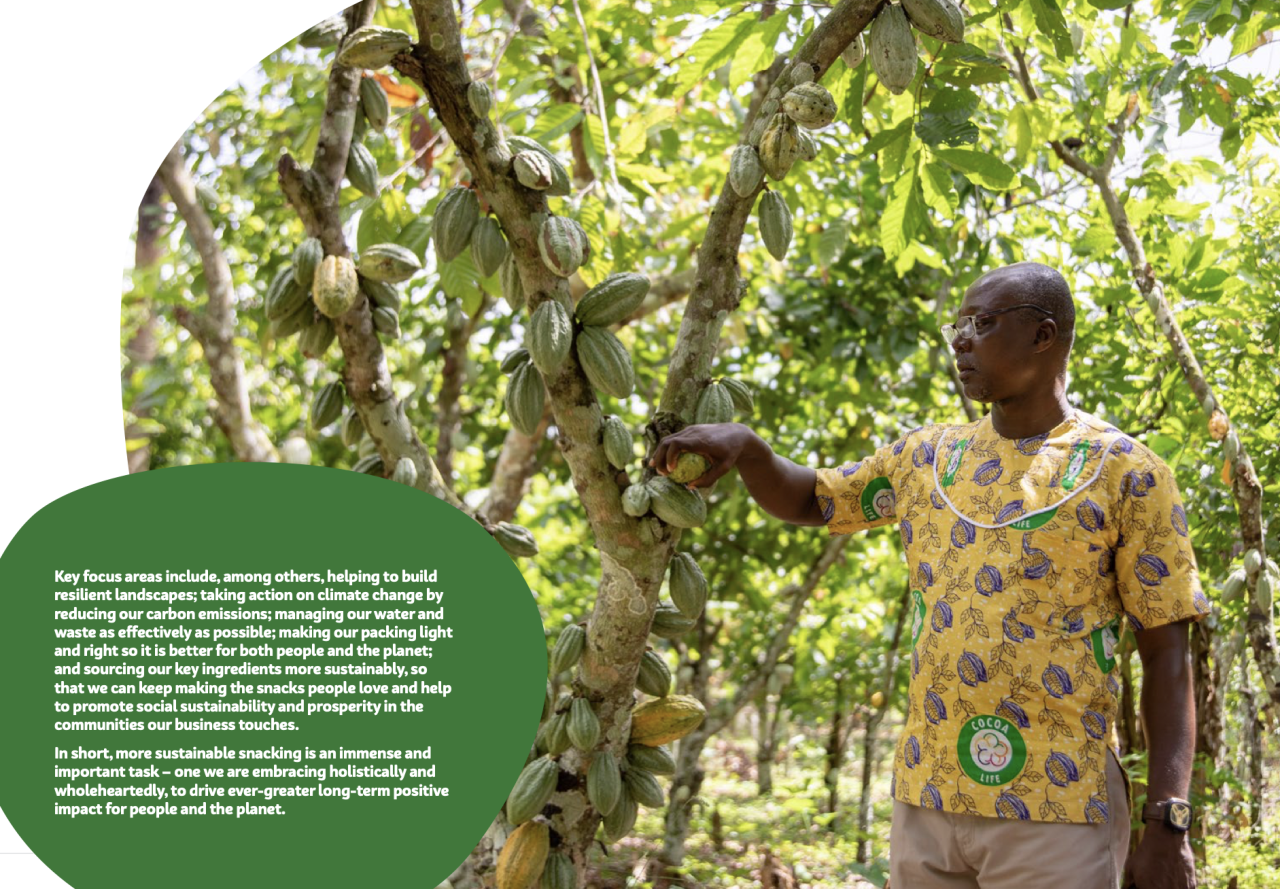Mondelēz 2022 Snacking Made Right Report: More Sustainable Snacking
NORTHAMPTON, MA / ACCESSWIRE / August 3, 2023 / Mondelēz International
Understanding and improving our impact on the environment and its systems is important for the long-term growth and success of our business and for all our stakeholders. To make snacking more sustainable, we strive to understand risks and their potential impact, focus on opportunities to lead where we matter most, and drive change where the world needs it most. We set goals in these areas - and add new ones over time - to enhance our ambition, impact and delivery at scale.
-
Key focus areas include, among others, helping to build resilient landscapes; taking action on climate change by reducing our carbon emissions; managing our water and waste as effectively as possible; making our packing light and right so it is better for both people and the planet; and sourcing our key ingredients more sustainably, so that we can keep making the snacks people love and help to promote social sustainability and prosperity in the communities our business touches.
In short, more sustainable snacking is an immense and important task - one we are embracing holistically and wholeheartedly, to drive ever-greater long-term positive impact for people and the planet.
Resilient Communities
For greater long-term positive impact on people and the planet, we focus on helping to create the resilient landscapes that are the bedrock of more sustainable snacking.
We take a broad, interconnected view of resilience - one that includes and links our environmental goals to reduce carbon emissions, our leadership in sourcing ingredients more responsibly, and our commitment to social sustainability and human rights across our value chain. All the different elements can and must reinforce each other. Indeed, our ingredient sourcing programs are where most of the work of our carbon emissions reductions and social sustainability efforts live. So as part of our signature sourcing programs for our key ingredients such as cocoa and wheat, we work hard toward more resilient landscapes, communities, and robust human rights to provide lasting economic, environmental, and social benefits for the communities involved.
Taking Climate Action
For several years we have been on a path to reduce our carbon emissions, and in 2022, we continued to move forward in deepening our understanding of our carbon footprint and doing more to reduce it. We're taking an end-to-end approach - from field to shelf - to work towards our long-term net zero carbon emissions goal by focusing our efforts across key areas.
Find out more on page 17.
Reducing Deforestation
We are working to reduce deforestation in our supply chain. We know this is important in order to address global climate change and protect the local ecosystems that farmers need to grow sustainable raw materials.
Our Lifecycle Assessment (LCA) helps to shape our priorities and goals. Insights indicated that deforestation within our supply chain represents the largest single contributor to our carbon footprint. Insights indicated that deforestation within our supply chain represents the single largest contributor to our carbon footprint. Data from our 2022 LCA show the contribution to Mondelēz International's total CO2e emissions from certain ‘forest-risk' commodities to be:
Cocoa: 5,900,000 metric tonnes
Oils: 2,107,000 metric tonnes
Dairy: 6,427,000 metric tonnes
But we cannot win the fight against deforestation alone. Action by individual companies needs to be scaled up to cover whole sectors, landscapes and countries. So, we support and encourage the sector-wide approach the Consumer Goods Forum is pioneering for a #forestpositive future, one where suppliers adhere to consistent practices across their business models and land use is optimized across sectors with the support of producer governments. We are striving to make an impact at scale and transparency is at the core of our approach.
Of the materials we source, cocoa and palm are the largest direct contributors to deforestation - we therefore advocate for systemic action that goes beyond our supply chain to drive change across the sector as a whole.
With respect to cocoa, deforestation is just one of a complex set of interrelated environmental, economic and social problems faced in cocoa communities, and we understand that ending deforestation is complex. As we develop solutions to help tackle deforestation, we also remain vigilant to avoid potential unintended, harmful consequences such as lost livelihoods or abuses of human rights. We have our corporate program in place, Cocoa Life, which aims to holistically help address the root causes of the social, economic and environmental challenges that cocoa farming faces. As a result, we see near to no deforestation on or closely around Cocoa Life farms in West Africa since 2018 (approximately
Find out more on page 37.
With respect to palm oil,
For our direct purchases of soy, where we have much less influence across the sector as a whole, we take a due diligence approach designed to achieve more sustainable sourcing in our supply, based on Consumer Goods Forum sourcing guidelines. For paper-based packaging we require the mills and printers that supply us to be Forest Stewardship Council (FSC) certified.
In addition, we also track indirect land-use change emissions from dairy, including palm and soy, used in cattle feed. We buy the majority of our dairy ingredients from suppliers who buy from farmers who, in turn, make individual decisions about what to feed their cows. Despite these challenges, we are engaging our suppliers with the aim of supporting moves to help achieve deforestation-free supplies of cattle feed across the dairy sector.
Find out more on page 30.
Increasing Regenerative Agriculture
To improve agricultural resilience, we are helping to transform agricultural production into regenerative systems while reducing carbon. We are focusing on agroforestry landscapes, biodiversity and regenerative practices across our key ingredients including cocoa and wheat. This involves participation in sector-wide initiatives and multi-stakeholder coalitions.
Find out more on page 30.
Enhancing Social Sustainability and Respecting Human Rights
We strive to make sure that the rights of people in our value chain are respected and promoted and that the communities where we matter most are more resilient. To this end, we focus on key areas for greater impact, including addressing human rights risks in sourcing key commodities, and focusing on living wage and due diligence across own operations.
Find out more on page 24.
Read more in the Mondelēz 2022 Snacking Made Right Report

View additional multimedia and more ESG storytelling from Mondelēz International on 3blmedia.com.
Contact Info:
Spokesperson: Mondelēz International
Website: https://www.3blmedia.com/profiles/mondelez-international
Email: info@3blmedia.com
SOURCE: Mondelēz International
View source version on accesswire.com:
https://www.accesswire.com/772212/Mondelz-2022-Snacking-Made-Right-Report-More-Sustainable-Snacking








